- Home
- Ian Buruma
Anglomania
Anglomania Read online
Ian Buruma
ANGLOMANIA
Ian Buruma was educated in Holland and Japan and spent many years in Asia, which he has written about in such books as God’s Dust and Behind the Mask. He has also written a novel, Playing the Game, a fictional biography of K. S. Ranjitsinhji, the Indian prince who played cricket with the MCC in Edwardian Britain. The Wages of Guilt, an exploration of how Germany and Japan have come to terms with their aggressive pasts, was published in 1994.
ALSO BY Ian Buruma
NONFICTION
Behind the Mask
God’s Dust: A Modern Asian Journey
The Wages of Guilt:
Memories of War in Germany and Japan
FICTION
Playing the Game
FIRST VINTAGE BOOKS EDITION, APRIL 2000
Copyright © 1998 by Ian Buruma
All rights reserved under International and Pan-American Copyright Conventions. Published in the United States by Vintage Books, a division of Random House, Inc., New York. Originally published in Great Britain by Weidenfeld & Nicolson, London, in 1998, as Voltaire’s Coconuts, or Anglomania in Europe. Originally published in hardcover in the United States by Random House, Inc., New York, in 1998.
Vintage and colophon are registered trademarks of Random House, Inc.
The Library of Congress has cataloged the Random House edition as follows:
Buruma, Ian.
Anglomania/by Ian Buruma.
p. cm.
1. National characteristics, British—Foreign public opinion, European. 2. Great Britain—Foreign public opinion, European. 3. Great Britain—Civilization—European influences. 4. Europeans—Travel—Great Britain—History. 5. Europe—Civilization—British influences. 6. Great Britain—Relations—Europe. 7. Europe—Relations—Great Britain. I. Title.
DA110.B975 1999
941—dc21 98-27387
eISBN: 978-0-307-82896-5
www.vintagebooks.com
v3.1
TO ANN BURUMA
AND
G. M. TAMAS
ACKNOWLEDGMENTS
Many people helped and inspired me during the writing of this book. There are several in particular to whom I would like to offer my special thanks. Conversations with John Ryle, Noel Malcolm, Ann Buruma, Graham Snow, Timothy Garton-Ash, Richard Nations, and Michael Ignatieff were invaluable in sharpening what began as a vague idea. Historical research was deepened and enriched by Michael Raeburn, Susie Harries, and Eva Neurath. Leo van Maris pointed me in the direction of valuable sources. Nicholas Philipson, Ian Jack, and Tom Nairn offered insights into Scottophilia. Ian Sutton and Emily Lane kindly shared their memories of Nikolaus Pevsner with me, as did Pevsner’s son and daughter, Dieter and Uta. Walter Blue and Lore Vajifdar helped me with my chapter on the refugee children. Michael Ignatieff, James Fenton, Leon Wieseltier, Stephen Beller, and Ann Buruma read various parts of the manuscript. Noga Arikha went through the final draft of the book with warm sympathy and a sharp eye. I could not have wished for better and more patient copy editors than Peter James and Martha Schwartz, a keener editor than Jason Epstein and his assistant, Ulf Buchholz, and more supportive agents than Andrew Wylie, Sarah Chalfant, and Jin Auh of the Wylie Agency. But even with the help and encouragement of all these people, I would have had a hard time finishing any task without the loving support of Sumie, my wife.
CONTENTS
Cover
About the Author
Other Books by This Author
Title Page
Copyright
Dedication
Acknowledgments
1. CHURCHILL’S CIGAR
2. VOLTAIRE’S COCONUTS
3. GOETHE’S SHAKESPEARE
4. FINGAL’S CAVE
5. THE PARKOMANE
6. GRAVEYARD OF THE REVOLUTION
7. SCHOOLDAYS
8. A SPORTING MAN
9. WAGNERIANS
10. JEWISH CRICKET
11. THE ANGLOMANE WHO HATED ENGLAND
12. LESLIE HOWARD
13. DR. PEVSNER
14. THE MAN IN THE TWEED COAT
15. THE LAST ENGLISHMAN
SOURCES
BIBLIOGRAPHY
CHAPTER
ONE
CHURCHILL’S CIGAR
IT WAS IN 1960, OR POSSIBLY 1961, AT ANY RATE BEFORE the first Beatles LP, that I went shopping for cheroots with my grandfather. He was over in The Hague on a visit from England. I was about ten. I was born in The Hague. My father was Dutch and my mother English. To me a visit to Holland by my grandparents felt like the arrival of messengers from a wider, more glamorous world.
My grandfather, who had served as an army doctor in India during the war, liked Burmese cheroots. These were hard to come by in Holland, but if there was one shop in The Hague that was likely to stock them, it was a tobacconist named de Graaff.
G. de Graaff was an old-fashioned family firm. A portrait of the founder, a man with elaborate whiskers and a stiff white collar, hung on the wall behind the counter. We were served by the founder’s grandson, a small, dapper man in a three-piece suit, with the slightly fussy manners of an old-fashioned maître d’. He opened some boxes of cigars for my grandfather to sample. One or two specimens were taken out, to be pinched and sniffed. A purchase was made. I don’t know whether they were Burmese cheroots. But I can remember vividly the look on the tobacconist’s face when he realized my grandfather was an Englishman.
De Graaff said he had something special to show. He smiled in anticipation of my grandfather’s pleasure. “Please,” he said, and pointed at the wall, where Cuban cigars were stacked. And there, in an open space, between pungent boxes of Coronas and Ideales, hung a framed glass case containing two long, cinnamon-colored cigars, dry as old turds; one had been partly smoked, the other was untouched. The case had been sealed with red wax. At the bottom was a copper plate bearing the simple inscription 1946, SIR WINSTON CHURCHILL’S CIGAR.
I found out more about the famous cigar on my second visit to the shop, almost forty years later. The old de Graaff was dead. His son, a tall man with a somewhat ostentatious gray mustache, showed me the glass case, the two cigars, and a letter from Queen Wilhelmina’s court marshal, in which de Graaff was thanked for his supply of fine cigars. They had been presented at the queen’s lunch for Winston Churchill. One of the cigars had been lit by Churchill himself and passed through his very own lips. The other came from the same box. The partly smoked cigar had been put away because lunch was served and the queen couldn’t abide smoking in her presence. However, the two precious relics were saved for posterity by Churchill’s butler, who passed them on to one of the queen’s footmen, who presented them to de Graaff, who then had his solicitor draw up the document to vouch for their authenticity.
My grandfather would have been amused and, being a patriot, probably touched by this gesture. Then again, in those days he might have been accustomed to such small tributes being paid to being British. Through the late 1940s and 1950s, and even in the 1960s, the British were considered a superior breed in places like The Hague. For the British, together with the Americans and the Canadians, had won the war. So had the Soviet Union, but the Red Army was never anywhere near The Hague, and besides, the Red Army was, after all, the Red Army.
The British are no longer regarded as a superior breed, even in The Hague. The image of Britain as the land of war heroes is disappearing. Now when the British return to wage war in Europe, they come as soccer hooligans: history repeating itself as a beer-flecked horror show. But I still grew up with the image of British superiority, which gave me vicarious pleasure as well as the kind of slight resentment one might feel toward a very grand parent. It was an image that owed a great deal to snobbery, but to something else, too, something more poli
tical in origin: a particular idea of freedom. The characters in this book—Europeans who loved or hated Britain—were either attracted by the ideal of British liberty or disgusted by it. Since I am one of my own characters, and the one I probably know best, I shall start with my own account, about growing up in The Hague, and about my grandfather, whom I worshiped with the intensity of which only little boys and religious fanatics are capable.
My grandfather, Bernard Schlesinger, was the son of a German-Jewish immigrant, which explains, perhaps, his particular brand of patriotism. I would watch him as a child, during the summer holidays, as he worked in his Berkshire garden, picking vegetables or pruning the fruit trees, dressed in corduroys and tweeds. Even though he was in fact a pediatrician in London, he seemed to belong to the landscape: the fields, smelling of hay; the villages, smelling of horse dung and smoke; and the large Victorian vicarage that my grandparents bought after the war, smelling of candle wax and polished oak. This was his home. He would talk to me about the importance of loving one’s country, and how he loved England. I did not understand the depth or the nature of his love. I was never unhappy in Holland, but from quite an early age it was a place I always thought of leaving. The world seemed more promising elsewhere (a state of mind that, once entered, will never leave you in peace). But to my grandfather, England was not only the country he was born and raised in; after Hitler, it was, in his mind, the country that saved him, and his family, from almost certain death.
To be saved. Can the feeling of liberation ever be transmitted to those who have always been free? My father, who was forced to work in a German factory during the war, was liberated in Berlin by the Soviet Red Army. His memories of freedom regained are set to the sound of Russian dances and Ukrainian folk songs (after the Stalin Organs and the Flying Fortresses). But his case was unusual. For most Dutch people, freedom came from the West. As a child I read stories of the so called Engelandvaarders, the men who sailed for England, in yachts, dinghies, even rowboats, anything that would float across the North Sea, to freedom. In the stories—though not in real life—they invariably made it and came back as heroes in Spitfires. Our ideas of England, or America, or Canada, were inseparable from the idea—rather abstract, to us—of freedom.
It is impossible to imagine quite what it must have felt like: the erotic rush of being freed. In the Netherlands, and elsewhere in Europe, the sexuality of liberation was not only subliminal; it was blatantly, frenetically acted out. Local men were pale and skinny from years of hiding, fear, and malnutrition. The sight of smiling GIs, lolling on the back of their jeeps, smoking Lucky Strikes and chewing gum, cannot have offered a greater contrast to the more familiar sight of marching German soldiers, stamping their boots and bellowing songs in perfectly drilled formations. Americans and Canadians, well fed, smartly turned out, and tanned from the Italian sunshine, liberated Holland to the swinging beat of Glenn Miller’s “In the Mood.” The British Tommies were perhaps weedier, knobblier, shorter. They carried less cash and could not show quite such immaculate teeth when they smiled their victory smiles. But the girls still adored them.
The summer of 1945 turned into an orgiastic celebration of liberty. At least seven thousand illegitimate children were spawned in one month in Holland alone. Everywhere, at street parties, in schools, in cafés and restaurants, there was the sound of swing and the smell of perfume, sweat, and beer. And sex: in short-time hotels, in rented rooms, in parks and abandoned houses, in jeeps, at dance halls, cinemas, and up against the walls of provincial back streets. Not until 1964, when girls jumped into the canals to touch the pleasure boat that bore the Beatles through Amsterdam’s canals like conquering heroes was anything like it seen again.
It seems so long ago, that summer of 1945, which to me is not even memory but history. And not even history per se, but movie history. In my mind’s eye, the liberators of ’44 and ’45 are not those anonymous men kissing girls on tanks in black-and-white photographs, but John Wayne, Kenneth More, Richard Burton, and Robert Mitchum landing at Normandy. I still weep at the scene in The Longest Day when the Frenchman, played by Bourvil, in his carefully preserved World War I helmet, waves a champagne bottle, like a madman, at the British and American troops who rush past him. “Welcome, boys!” he shouts. The soldiers laugh but have no time to stop. They are amused, but they fail to see the pathos of the situation; they cannot feel what he does. He is the one being freed. In the end, he is left on his own, in the rubble of his town demolished by artillery and bombs, still cradling his bottle of champagne, with no one there to share it.
When I stood in the center of Amsterdam, exactly fifty years after liberation, watching the British and Canadian jeeps pass by once more, perhaps for the last time, in celebration of Liberation Day, I had a whiff of what it must have been like back then. It was hot. The streets were packed. There was music: Glenn Miller on the square in front of the royal palace; Vera Lynn somewhere near the hot dog stands behind the Krasnapolsky Hotel. Young people danced to a rock and roll band, and over by the station somebody was playing “Hail the Conquering Heroes Come.”
It was a sentimental, anachronistic reconstruction. How could I know what it had really been like? I wasn’t hungry, for one thing. Yet it was impossible not to be moved as the jeeps rolled slowly down the Damrak toward the royal palace. Elderly Canadian and British veterans, dressed in uniforms that no longer fit, tried to keep their lips from trembling as men and women, especially women, along the route surged forward to touch their hands, the way they did fifty years ago, shouting, “Thank you! Thank you!” For a few hours, old men, whose stories had long worn out the patience of the people back home, were heroes again in the country they had liberated.
It is one of the great differences between Britain and the western seaboard of Europe, this divide between those who remember being freed and those who did the freeing. Since these experiences have passed into history, the actual memories have dimmed, but the divide remains. It is there, like a shadow, clouding every British debate on “Europe”: Britain is free, Europe must be liberated or left to its own devices. It is disturbing to hear British nationalists ranting against “Europe” by invoking Churchill’s war, precisely because I, and others of my generation, still respond to such rhetoric so easily. But to see the rhetoric of freedom as simply a product of Dunkirk nostalgia is to miss an important point. The idea of British freedom under threat from Continental tyranny goes back centuries. And it is not entirely spurious.
Britain has been a haven for refugees from many purges and tyrannies: Huguenots in the seventeenth century, aristocrats after the French Revolution, revolutionaries after 1848, Jews in the nineteenth century and again in the 1930s. This idea of freedom—not egalitarianism or fraternity—is what has drawn people to the United States as well. And there are similarities between Anglo- and Americophilia. The French often lump les anglo-saxons together as a composite model of economic laissez-faire and shallow materialism. The idea of a special Anglo-American bond still has a sentimental appeal in Britain and among the eastern upper classes of America. And yet there is also a great divide in the camp of the liberators.
It was visible in June 1994, when the D-Day landings were remembered in Normandy. Veterans from many countries marched on the beaches, stiffly, proudly, aware that this might be their last reunion. Bands played; people cheered; neat rows of soldiers, buried in the war cemeteries, were thanked by public figures for having “laid down their lives” for freedom. Representatives from all the main Allied powers spoke. But I was struck, watching the proceedings on television, by the differences in style.
The United States was represented by its elected head of state. But President Clinton was too young to remember D-Day. And on this occasion the veterans’ speeches carried more weight. They were elderly now, bald, white-haired, portly men, dressed casually in T-shirts and baseball caps. They did not stand stiffly to attention. These were the men who had lolled on the back of their jeeps, smoking Lucky Strikes, as they rode into t
he arms of thousands of girls in Paris, Brussels, and Amsterdam. Their speeches were not flowery, or poetic, or even very eloquent, but they spoke of liberty without a hint of old-world cynicism. They believed in it, and this gave them a dignity that no amount of pomp could contrive.
In British ceremonies and commemorations, the tone was set by royalty, nobility, and the clergy, dressed up in traditional finery. The duke of Edinburgh spoke about freedom and survival, and the veterans, wearing their wartime decorations, saluted the duke with quivering hands. They marched past the queen and saluted her too. Archbishops delivered sermons, and the chaplain-general carried out his duty with solemn grace. BBC reporters told their viewers in hushed tones “how well we still do these things.” There is indeed a certain poetry in British pomp and something grand about the pride in continuity and the belief in tradition—even if the tradition is often not as old as it pretends to be. The ancien régime of Britain survived, heroically, while America liberated the world, or at least large parts of it.
No doubt many people, including Americans, would have found the British talk of freedom and the deference paid to social rank contradictory. Many British people, especially those on the left, would too. But not British conservatives, and not a certain kind of Anglophile. For they would argue that freedom and democracy are safeguarded by deference and tradition—vox pop tempered by enlightened aristocracy. That was the Britain Winston Churchill stood for. It is the reason why a snobbish tobacconist in The Hague was so proud to own a stub of the great Englishman’s cigar. If freedom is one component of Anglophilia, snobbery is another.
THE HAGUE ALWAYS was a snobbish town. As with many snobbish towns, there is not a great deal to be snobbish about. The criminal underworld is large and brutal. The people are not especially friendly, and the local patois is rough and charmless. But The Hague is the official residence of the royal House of Orange. The government is there, and so are the embassies. From the seventeenth until the late nineteenth century, the town had a certain cosmopolitan elegance, with a fine municipal theater built in the French style, and several good concert halls. Mozart played there as a child prodigy. Voltaire spent time in The Hague. The leafy center, near the medieval parliament building, was a place for fin-de-siècle flâneurs to be seen, strolling among the trees of the Lange Voorhout, on their way to the Hotel des Indes, where Anna Pavlova, the ballerina, died in her suite in 1931. (Round the corner lived Mata Hari, who entertained her gentleman friends at the same hotel.)

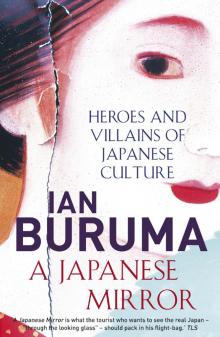 A Japanese Mirror
A Japanese Mirror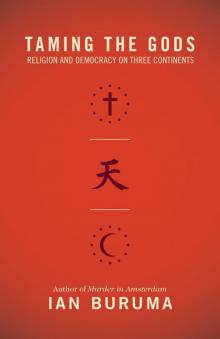 Taming the Gods
Taming the Gods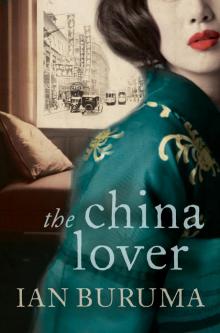 The China Lover
The China Lover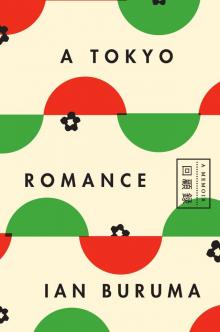 A Tokyo Romance
A Tokyo Romance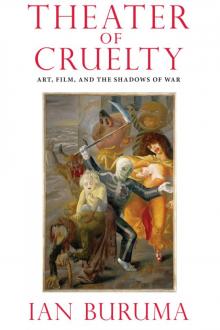 Theater of Cruelty
Theater of Cruelty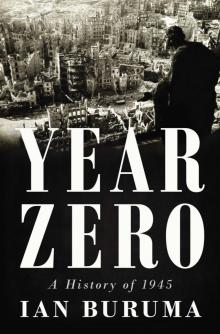 Year Zero
Year Zero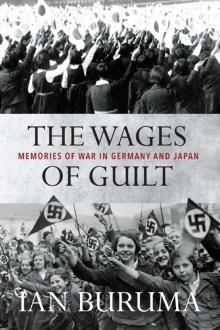 The Wages of Guilt
The Wages of Guilt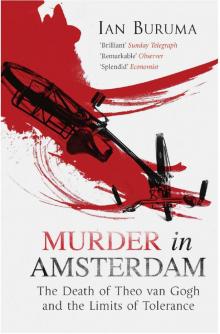 Murder in Amsterdam
Murder in Amsterdam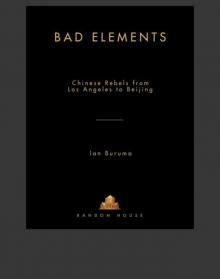 Bad Elements
Bad Elements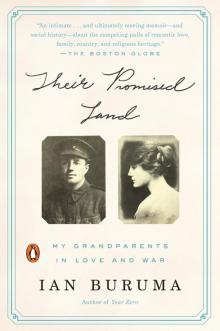 Their Promised Land
Their Promised Land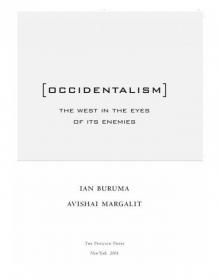 Occidentalism
Occidentalism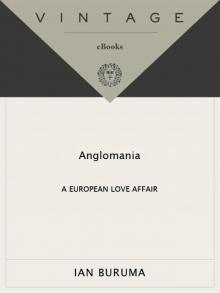 Anglomania
Anglomania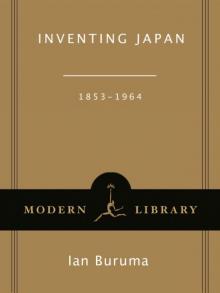 Inventing Japan: 1853-1964 (Modern Library Chronicles)
Inventing Japan: 1853-1964 (Modern Library Chronicles)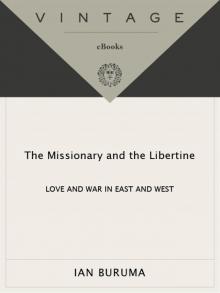 The Missionary and the Libertine
The Missionary and the Libertine